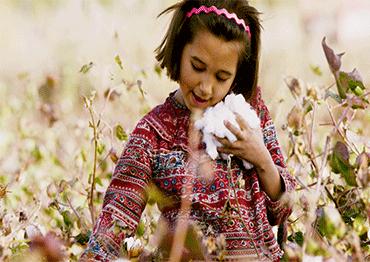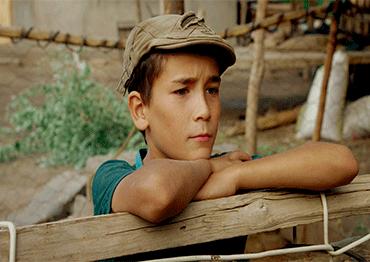A First Farewell revolves around three childhood friends - Isa Yasan, Kalbinur Rahmati and her younger brother Alinaz. Isa spends most of his time tending to his family’s goats and caring for his mother, who can neither speak nor hear and suffers from mental illness. Kalbinur and Alinaz not only struggle in their school subjects, particularly Chinese language, but also with their parents’ conflicting ambitions. Their father wants to stay in the countryside to work in the cotton fields, while their more ambitious mother is determined to move to the city for a better paying job and better education for their kids.
The inseparable trio enjoy carefree times together, playing with a lamb they keep, romping in the sand dunes, and climbing a nearby poplar tree. But the children gradually realize that part of growing up is leaving thepeople they love. Isa has to say goodbye to his older brother, who goes to the city for university, and his mother after his father sends her to a nursing home. The three friends must say goodbye when the siblings’ family leaves the village for the city.
The film depicts a bucolic and tranquil way of life left undisturbed for centuries, filled with harvesting cotton, herding, tea breaks with flatbread and traditional Uygur songs. But underneath the surface, both children and adults are dealing with tremendous changes.
Learning standard Chinese, also known as Putonghua, poses an enormous challenge for Kalbinur and her brother, who both score low on tests. Their mother blames her husband for not taking their children’s language studies seriously, which could open more opportunities for the family.
“I did not realize how important Putonghua is. Now you need it everywhere. […] I hate being poor,” Kalbinur’s mother complains. Her desire for social mobility eventually drives her to move the family to a faraway town that has Putonghua-only schools.
Just like Isa and Kalbinur, Wang grew up in a tiny village in Shaya County, about a 30-minute drive from where the film is set.
She had a similar childhood. Wang remembers lying down and watching the moon rise in the desert and chatting with friends under the trees. Sometimes as they played, elderly Uygur locals driving carts would yell: “Naughty kids, hop on and let the horse take you for a ride.”
The taste of mulberry lingers in her memory. “Mulberry and Russian olive trees lined the main village road. Often we’d pick mulberries on the way to school. People walking by would help us and shake the trees, saying: ‘Take the mulberries to school. A sweet berry sweetens your entire day,’” Wang said.
Wang was eager to leave the village and see more of the world. In 2007, she left to attend university in Hunan Province. But only when she was far from home did the true beauty of Xinjiang grip her heart.
Every time she went home, she watched as the poplar trees and matchbox-like houses rolled past her taxi window as folk melodies flowed from the radio. She felt something within her had awakened.
“I didn’t understand Xinjiang until I became an adult. I gradually realized that at its core is a poetic beauty that could be found everywhere, from the language to the softly whispering Tarim River,” Wang said.
In 2014, Wang attended a graduate course in television production at the Communication University of China in Beijing. For her project, she planned to film a documentary about the land where she grew up.
She spent one year in Shaya County, where she eventually focused her lens on three children - Isa, Kalbinur and Alinaz. She spent another year living with them and filming their everyday life. Wang described the finished product as ¡°a long poem dedicated to my beloved hometown.”

 Old Version
Old Version

